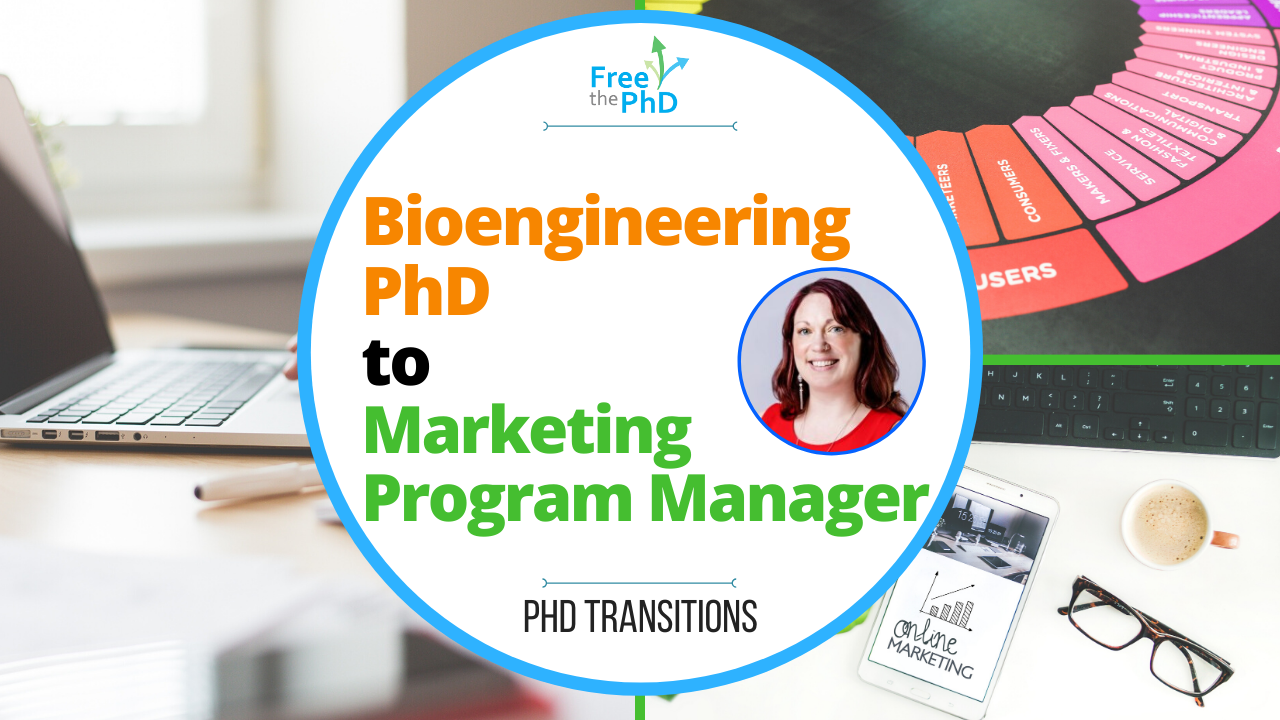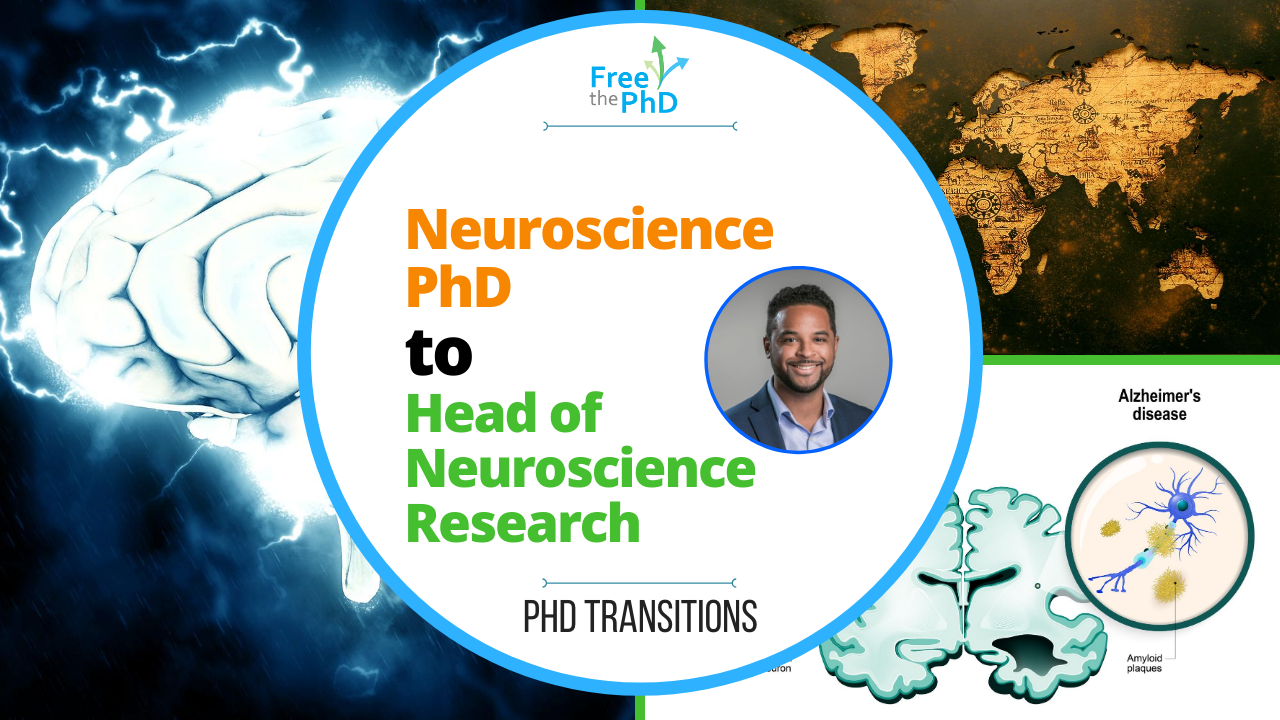The journey through a professional career can take us on interesting new paths. For PhDs who wish to leave the academic career ladder, you might be anxious about what happens after you start your first job. What is it like to do something completely new? Do you have to stay in that career path forever? What if you want to shift into a different role, or a different field? Let’s catch up with Dr. Elizabeth Schneider, Marketing Program Manager at NanoString Technologies, who shared her first transition out of academia with us at Free the PhD (a very worthy read!)
She generously agreed to follow up with what happened next (hint – she has since moved into a new position)!
Welcome, Dr. Schneider! Could you think back to when you were just getting into the swing of things in your first job out of academia as a professional sales representative, and tell us how the experience was?
During my first year in sales, there was a lot to learn. I had a great mentor who taught me all of the things that I would need to know for the day-to-day job: how to manage a sales funnel, how to use a CRM (customer relationship management database), how to manage my time, how to do prospecting, etc. In your first year, you’re just getting your feet wet and starting to understand how the business works. In that first year, I wasn’t very successful in terms of sales, but this is common when you are new to a given territory.
By my second year, I hit my quota and was starting to feel that I knew what I was doing: I could work independently and bring in orders. I closed opportunities that had been lingering for quite a long time in the sales funnel (sometimes for several years!). I was able to work with customers to allay their reservations about the technology, help them get funding, and then close the opportunity by shepherding the purchasing process. I also closed opportunities that were completely initiated by myself from scratch via reaching out to the prospect by email, phone or over LinkedIn.

In technical sales, you can represent a single product, or multiple products. What was your situation?
By my third year with the company, I was doing territory management for only one product. My manager decided that they were going to do something a little different, and actually gave me all three of the company product lines. I was the only rep in North America who worked with all three of the product lines in one territory. I was humbled to be offered that opportunity, because it meant that my success as a salesperson was validated by my peers, colleagues and manager.
The first product I sold with the company, I used as a graduate student. I had direct experience with it. The other two product lines I had never had any experience with, and often we had to demo them in front of the customer. I was a bit nervous. Learning the ins and outs of these new products was daunting, but in the Fall of that year, I finally got to the point where I could do instrument demonstrations by myself and close a sale! I hauled this big Pelican case with the instrument from place to place, gave a seminar in a room full of scientists (and most of the C-suite if it was a smaller company), and then I would do an instrument demo. Sometimes the demo was done right in front of everyone at the seminar, and sometimes I would work with the customer for a longer time to demo the instrument while doing some experiments.
I felt proud of myself. I knew at that point I had enough acumen, intelligence and technical background that I could pick up any type of scientific equipment, and, based on my knowledge and on-the-job training, I could get to the point where I was an expert in that product, could work with it in front of a customer, and sell it. At the end of my five-year tenure, I had given over 100 different presentations to various different companies. That’s when I really hit my stride, and started getting more and more orders from new customers who were previously unknown. In my last year with the company I was ~20% over plan by the end of the year.

That’s awesome! I can definitely relate from first-hand experience! At this stage, you saw signs of success and understood the metrics that people were looking for. What were you thinking in terms of your next steps? Did you want to continue in a sales role?
Good question. I was happy with my job and knew what I was doing. But I got to the point where I wanted something more, something different; an additional challenge. I was told I could go into a sales management career path, but realistically, there really wasn’t much room for me to grow because the company was so small. At the time, I was looking at going into product management or marketing. A position opened up at the company headquarters in Sweden. I was very excited about it, and thought I had a good chance at doing well in the role because I had the technical background and the customer-facing experience. I was also thrilled at the chance to live in Europe!
I applied; however, the company was reluctant to consider me for the position as they knew they could not afford to lose me as a salesperson. They also didn’t have the infrastructure in place to bring employees from the US over to Sweden. They ended up hiring someone from outside the company who was local. While that was disappointing, I understood the reasoning behind it. So, I started to look elsewhere. When I spoke with recruiters or people in marketing, I found that it is difficult to jump from one company to the next and go straight from sales into a marketing position, because you don’t have any proven experience in marketing. It’s easier to maintain your role in sales at a different company, demonstrate competence, and then leverage your credibility to transition into a different role.
So where did you look and apply?
One of my potential customers at the time was Illumina. I distinctly remember going to their headquarters and being completely blown away by how impressed I was with the company. I decided to make it my personal goal to work for a company like Illumina – a large, molecular biology instrumentation company. When I initially started applying for positions I ran into some roadblocks. Because I didn’t have any direct sales experience with NGS, PCR, microarrays, etc., my resume was overlooked. Although I knew I could pick up on the technology and sell it well, employers wanted someone who had direct experience selling their product. I grew frustrated.
I hit a break when a recruiter contacted me through LinkedIn for a position at a company called NanoString. I had actually targeted NanoString as a potential customer at the time. When the recruiter contacted me, she told me that they were looking for a pharma account manager in the Bay Area. Although I had worked with biotech companies in my role at the time, it was more on the formulation side and less on the molecular biology side, so I didn’t have a contact list or Rolodex of names that was desired for the pharma account manager position. The recruiter immediately realized that and said “You’re not the best fit for this role.” But then she said, “You know what, we actually have a Regional Account Manager position available with the same company in Seattle. Is that something you would consider?” Honestly, I did not want to leave the Bay Area and I thought long and hard about her proposition. However, my philosophy in life is to never leave any opportunity on the table, so I said I was open to it, and the conversation continued.
I talked to the hiring manager, and I think he liked my resume because I had to be a very scrappy salesperson in my first job. I had to be my own marketing team; my own sales team; my own Application Scientist. I had essentially doubled the install base within my territory; I sold as many instruments in five years as the company had sold in 13. It turned out there was another position in the Bay Area opening up that NanoString would also consider me for – a consumable sales position—so I did the interview, gave a presentation in person, and it went really well. I distinctly remember presenting on the technology I had been selling in my current role, and I said: “It’s great to be here because I have targeted NanoString as a potential customer. The best-case situation is that I get this job. The worst-case is that I get a sale!”
Win-win!
Yes! At the end of the interview I was told, “We’re going to offer you a job. You need to decide which one you want to take. Do you want the Bay Area position or do you want the Seattle position?” The interview was on a Friday, and I had to tell them by Monday. I had the weekend to go home and think about if I wanted to move to Seattle.
That’s a big decision. I can’t believe they only gave you a weekend!
I’ll tell you what ultimately helped me make up my mind. When I did the interview, I wanted to go see the other building where R&D was housed. The NanoString recruiter took me over to see it at the end of the day, and I walked through the lab space and was very impressed. There was a lot of hustle and bustle; a lot of people clearly engaged in doing interesting science. I also noticed that most of the people seemed really energetic, enthusiastic and motivated. I thought to myself, “This is where I want to be. Headquarters is where the action is.” So, I decided to take the job in Seattle.

When did you start? Did you take any time off between jobs?
I do wish I had taken time off between positions! I literally quit my job on one day and started the very next day at NanoString. Part of the reason behind doing this was that they were having their global commercial meeting soon and they wanted me to attend it.
In hindsight, I’m happy I did that, because I was able to forge relationships right away with a lot of people from different departments, and I was able to absorb a lot of information. It was very surreal. I remember going to the meeting and it was at one of the Channel Islands off the coast of South Carolina. I remember thinking, I feel like I’m in a fairy tale! A week ago, I was with another company and I wasn’t sure where my career was going. I set a goal of working for a company in molecular biology and it worked out that!. I was in disbelief and considered myself fortunate.
Were you able to transfer your previous sales experience to a new product and market?
In the beginning, it was overwhelming because I had to learn a new territory and a new product from scratch. My previous experience of working with a technology I had never had first-hand experience in, of using my technical background and on-the-job training to become an expert, really came in handy. I got caught up to speed by reading product literature, perusing the company website, and going to company events like the global commercial meaning,. I felt comfortable explaining the technology to people and how it worked from an early stage.
On one of my first trips to meet with customers in Canada, the Field Application Scientist I was working with was supposed to give a seminar, but he fell sick. I ended up having to give the seminar myself. This was in April, and I had started at the end of January. Two months into the job, I was giving a seminar on my own in front of a room full of customers/potential customers. Many NanoString customers are medical doctors and medical researchers. I was nervous giving the presentation; although I have a background in biology, I felt like I was not as educated as the people I was presenting to. But it turned out really well!
The sales skills that I picked up previously—the ability to manage my time; to stay organized, to prospect, to negotiate, to pull an order through the purchase process—they all paid off.
It sounds like things were going very well! You’d mentioned wanting to ultimately move into marketing or product management, or maybe a position that involved less travel, and more importantly, based at headquarters. How did you make the move into Marketing?
From the beginning when I joined NanoString, I made it very clear to everyone that I was interested in moving from the field in-house, especially because I was local. I had always been a prolific user of LinkedIn in terms of posting content about our products, services and technology. People in the company started to take notice. I was essentially doing my own marketing! The combination of expressing interest in marketing to my manager and showing that I was actively doing my own marketing gave me a lot of visibility within the company.
At one point, there was a marketing meeting, and my manager was talking to the VP of Marketing. The VP asked if there was anyone on the sales team who might be able to attend the marketing meeting and represent the sales team. My manager nominated me to attend. I attended the marketing meeting, and the VP of Marketing was aware that I was interested in working with the marketing team. The next year, I was approached by our VP of Worldwide Sales. There were two product management positions that opened up on the marketing team, and he called me and said, “Elizabeth, you strike me as someone who is not interested in being a salesperson for the rest of her career. There are two open product management positions, and I think you would be great for them. You should consider applying.” I was taken aback because I hadn’t even considered these positions. I was more interested in the marketing [communications] side of things, but I thought about it, and decided to go for it.

Something I really take to heart as career advice is that you should never leave an opportunity unexplored. Opportunities come along when you’re not necessarily ready for them. We always have this plan in our minds of what we want to do in our career and the timing for career changes, but it doesn’t always work out the way we envision. I would have liked to stay in sales at NanoString for longer; I was just getting to that stage where I was starting to hit my stride and would have started hitting my number.
But I thought, “I don’t know when this position is going to come up again. I should go for it.”
I ended up applying for one of the product management positions over the other. Because I had made an impression on other people within the marketing team, they realized that instead of a product manager position, my ideal position should be all about inbound and outbound marketing. So, they ended up changing the title of the role to better suit my interests. I am very grateful for that.
I accepted the position of Marketing Program Manager and started working in that capacity in the Fall of 2018. I manage marketing programs for our immunology and oncology gene expression panels. I manage activities related to inbound marketing: blog posts, webinars, social media, etc.….any activity where we’re trying to attract people to come to our website or booth at a conference. I also do outbound marketing, including email, new product launches, and I help create the value proposition and messaging for new products, marketing collateral, and product bulletins. I put together white papers, technology notes, and application notes. I end up doing a fair amount of writing, which I enjoy. This position has been a great fit for me because I get to use my technical background, but I also get to be a bit more creative. I still get to travel, but don’t travel as much. There is less pressure and stress because I don’t carry a sales number anymore.
I work very closely with our marketing communications team to help queue up email blasts and create product graphics. I work with product managers for different reagents and instrumentation. I also work with the R&D department when we’re developing a new product or creating an application note, white paper, etc. It’s been a great experience for me and I’ve been really happy!
Do you like it more than sales?
I wouldn’t say that I like it more or less than sales. It’s just a different type of role. There is a part of me that likes chasing sales and hunting down new customers. I do look back on my sales days with a little bit of nostalgia. But I think I’m at a stage in my life right now where I just wanted a change. I had been doing sales for over six years, and I wanted to do something different and learn new skills. This has been a really great opportunity to try something new and take my career in a different direction. I’m really fortunate to have had this opportunity.
That’s fantastic. Your sales experience informs your marketing strategy and perspectives and vice versa. I totally see that as a very synergistic (excuse the business buzzword) way to develop your career skills. Thank you, Dr. Schneider, for sharing your insights and latest career adventure with Free the PhD!
By Vay Cao, Ph.D.
Got questions or comments, or aspire towards a similar career path but unsure how to get started? We’ve helped PhDs like you to land research, consulting, science communication, commercial, and client facing jobs with step-by-step, realistic guidance, based on our first-hand experience working away from the bench. Join our Free the PhD Careers Community for personalized help with your resume, networking, interviewing and skill-building to find a life you love outside academia!




